#one of the very few unambiguously wonderful things of modern life
Text
one of the only good things about modern life: bird bath cam
Thinking about how Percy Bysshe Shelley would have been riveted by birdbath and watering hole cams
This gentleman would watch a birdbath cam in Michigan or Aix-en-Provence with tears in his eyes
Do you not think he would have a whole birdbath-cam-poetry volume? Because he very obviously would
Do you not think he would be following with passionate interest the doings in the nest of the ospreys on the Finnish Meri Kotka YouTube channel?
The ospreys, the juncos, the blackbirds!
O cloud, o time, o bead of dew light-filled
shining suspended on talon, on wing:
what to that my betrayed beating heart?
#bird bath cams#one of the very few unambiguously wonderful things of modern life#if you know of a reason why they are Not Good#please do not tell me it would break my heart
2 notes
·
View notes
Text
January 14, 2021: GoldenEye (1995) (Part 1)
He’s suave. He’s sophisticated. He’s spy. He’s...
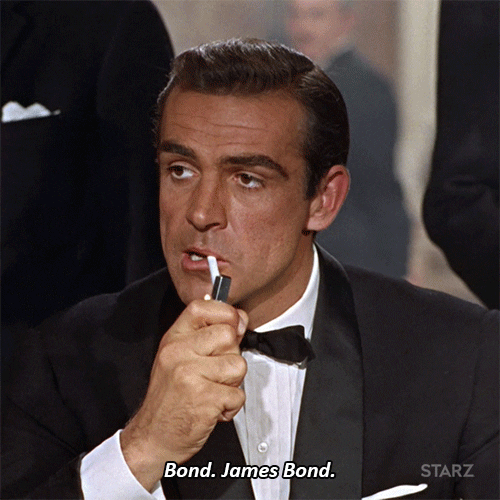
The late, great Sean Connery.
Ignoring the less then savory aspects of his personality (AKA the Barbara Walters interview...both of them), Connery is undoubtedly the most famous Scottish actor of all time. Sorry, Whovians, I love David Tennant, too. But Connery’s got him beat. He’s been in so many iconic films and roles, his influence is undeniable. But most famous of all is his turn as Agent 007, the man himself, James Bond.
I’ve seen all of Connery’s original Bond films (not counting Never Say Never Again), and my favorite is Goldfinger, in case you were wondering. But outside of that...I haven’t seen any Bond movies. Since him, the character’s been played by David Niven, George Lazenby (now THAT’S an interesting story, lemme tell you), Roger Moore, Timothy Dalton, and the two I’ll be looking at this month: Pierce Brosnan and Daniel Craig.

I’ll be looking at Brosnan tomorrow, in Casino Royale. But today, I’m looking at arguably the third most-famous Bond, Pierce Brosnan, in one of the most famous modern Bond movies, GoldenEye.
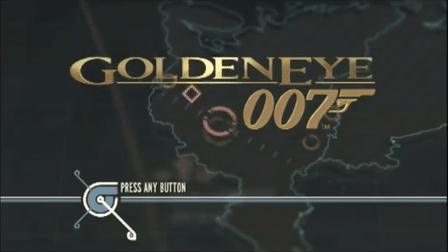
Also, yeah, never played the game I KNOW IT WAS A ‘90S CLASSIC I WASN’T ALLOWED TO HAVE VIDEO GAMES.
So, what to expect from a Bond film? Well, I’ve got a checklist here, hold on...HERE we go:
Gadgets
Girls
Good-for-Nothings
...Good music?
I’m feeling a little alliterative of late. But, yeah, looking for the Bond Girl, looking for cool gadgets, looking for dastardly villains, and listening for the theme song for the film. Got my list set, and expectations are set to Connery levels. Let’s do this, shall we?

Recap
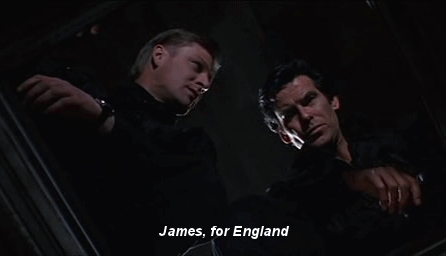
We start at a dam in Russia. Bond James Bond (Pierce Brosnan) is infiltrating the dam, and we get our gadgets checked off right away, as he whips out an acetylene torch. He barges in on a guy in the bathroom (rude, and awkward), then meets up with Alec, AKA Agent 006 (Sean “he dies, he’s the villain, or he’s the villain who dies” Bean).
Yeah, calling it now, Alec here’s gonna die, or he’s the villain, or he’s the villain who’s gonna die. It’s Sean Bean. More importantly, it’s Sean Bean in the ‘90s. There are very few options for him. Anyway, the Russians try to stop them from blowing up the plant, and...well, Alec’s being held hostage. Yyyyyyup. And he gets shot?
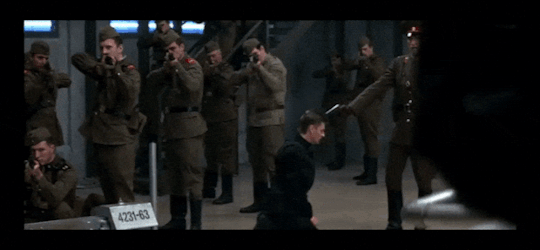
I don’t know how...but I’m betting that he’s still the villain. He’s Sean Bean. C’mon. He doesn’t die this early in a movie.
The unambiguously evil Russian general (hey, the Cold War just ended) almost get Bond, but he escapes in typical Bond fashion. They chase after him, and Bond chases an airplane. How, do you ask? I WILL FUCKING SHOW YOU HOW.
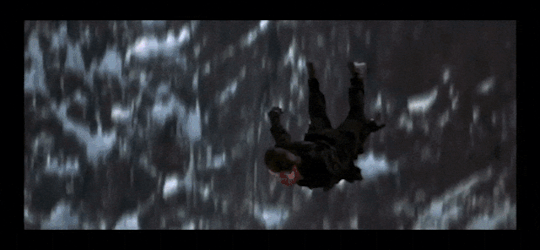
WHAT??? WHAT??? Physics just broke, and Issac Newton just tunneled to China. And then the facility blows up.
And THEN the opening begins. Let’s hear the Bond song and check out the opening.
youtube
...WOW. Just...I mean...OK, so Bond songs. From the first Bond movie, Dr. No, up until the one before this one, Licence to Kill, the intros were designed and directed by Maurice Binder. They were all composed of silhouetted women, often against colorful backgrounds, and almost always nude or skimpily dressed. There would often be themes or objects seen in the film itself, and sometimes actual scenes, often projected onto women themselves. They all definitely had a similar feel and style. And then, Binder sadly passed away in 1991.
Enter Daniel Kleinman. This is Kleinman’s first take, and this is also the first movie to use CGI. While it’s not terribly obvious or gaudy in the film proper, Kleinman uses this new technology to make this intro SURREAL AS HELL. It expresses the film’s connection to the fall of Soviet Russia, and a post-Cold War society. And is does that in a pretty obvious, if abstract and dramatic, manner. And honestly, on retospect...yeah. It definitely works. Even the song, which is sung by Tina Turner and written by Bono (yes, really), works well by itself, and in my opinion, better when with the actual film. So, crazy and weird as this sequence it...kinda grew on me. I like it! Weird, but I like it a lot.
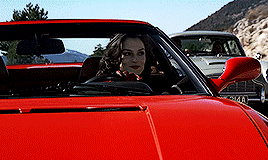
We cut to nine years later, with Bond taking a woman on a drive/race on a cliffside highway with...well, there’s our Bond girl! This is Famke Jannsen, playing...Xenia Onatopp.
Yes. Really. Oh boy. We aren’t being even slightly subtle about this, huh.
The woman in the car demands him to stop, and they make out, as one would expect. That night, he heads to a party, as James Bond does. At the party, James enters a card game with Xenia. Again...as James Bond does. This is immediately followed by him hitting on Xenia, ordering a vodka martini (shaken not stirred), introducing himself as “Bond, James Bond,” commenting on the Bond Girl’s name, and saying suave shit.
HOLY SHIT THAT SENTENCE ALONE HAPPENED WITHIN 1 MINUTE OF SCREEN TIME
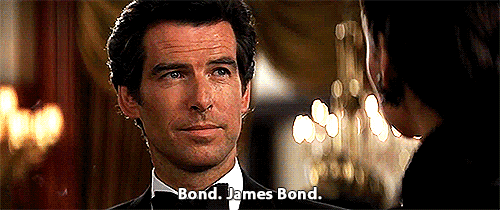
Look, movie, when you got a Bond...you gotta space that shit out. Ration it a little bit, not front load all of it WITHIN FIVE MINUTES AFTER THE OPENING’S FINISHED. It’s like giving someone a beer, and then they EAT THE FRIDGE.
Jesus. OK, Miss Moneypenny (Samantha...Bond, that’s neat!) gives Bond some information, tells him not to have sex with Xenia until they tell him to (yes, really), and then say’s that she trusts he’ll say…”On-a-Topp of things.”
YES. REALLY.
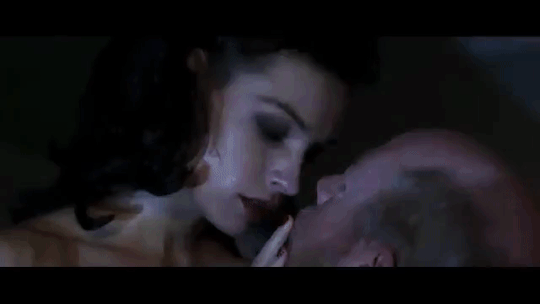
Speaking of Xenia, she’s with an Admiral, having the most TERRIFYING sex I’ve ever seen in a movie. And I’m legit not sure if he survived after it. Like, real talk, it was...frightening. Somebody steals his ID, real nonchalant like, and we cut to the next morning, after his maybe-death? James makes it onto the yacht the next morning (they were on a yacht, by the way), planning on getting some information.
Meanwhile, the ID is used by...someone...to get into a leader of global military leaders. Pretty sure the Admiral got Kegel’d to death; not even joking, it’s a real possibility, and I am shaken AND stirred. And so was the Admiral.

See? Toldja.
Looks like their unveiling a new tactical helicopter, the Tiger. However, the pilots are shot by Xenia and someone else, and they take their place, stealing the helicopter. Bond tries to stop it...even though there’s literally no way he could’ve known they were going to steal the helicopter? I mean, I guess you could assume that, but...I dunno, it’s a stretch.
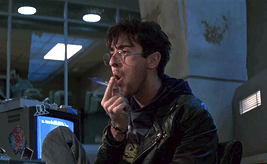
Meanwhile, in Siberia, a group of radar analysts or some such, where we meet Boris (Alan Cumming, who I feel like I never see play an actual Welsh person...or in a good movie) and Natalya (Izabella Scorupco). Boris is a thirsty computer nerd who hacks the US government for fun (because ‘90s nerds in movies were basically only this), and Natalya puts up with him.
The Tiger helicopter arrives, carrying Xenia and the General (Gottfried John, by the way) from the dam 9 years ago. They show up here, seeking something. Xenia shoots up the place, killing everybody except Natalya (and maybe Boris, since we didn’t see him die). Xenia, by the way, appears to be a straight sadist, enjoying inflicting pain on unsuspecting victims. The two leave, getting what they came for.
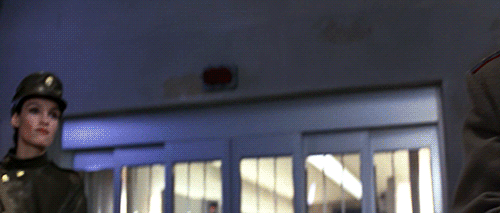
London! James Bond returns to MI6 headquarters, and meets his secretary Miss Moneypenny, who calls him the fuck OUT. She is my favorite character now.
MI6 has intercepted a distress call from the station in Siberia, and found the helicopter. The mission is heard by both Bond and M (Dame Judi Dench herself, pre-Cats). Meanwhile, the base in Siberia is hit an electromagnetic pulse originating from an orbiting satellite, which causes EVERYTHING to explode. Pretty sure that’s not what EMPs do, but why not? Suspension of disbelief.
Natalya’s still alive in there, by the way. And she’s not having a great day. You know those work days, right? Your coworkers are all dead, your equipment and office space explode, you’re trapped in a burning building, two American jets get hit by an EMP and crash into the building. Mondays, amirite?
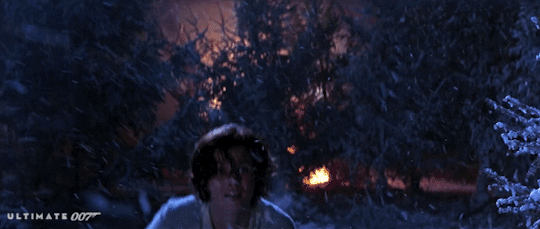
And in case literally everything didn’t make it clear by now, this is a Cold War movie, taking place after the Cold War was concluded. See, the McGuffin for this film (it’s a Bond film, it’s kind of a requirement) is Project GoldenEye, a nuclear weapon meant to detonate in the upper atmosphere, creating an EMP. The weapon was developed during the Cold War, and has now been stolen by the Janus Crime Syndicate, whose heads include Xenia Onatopp. General Ourmunov is also suspected to be a part of it.
This information all comes out during an exposition speech, as is standard for a Bond movie. But after that speech...OH...OH, it’s so good. See, up until now, Miss Moneypenny was really the only major female recurring supporting character in Bond’s life. But we’ve flipped the script, having M played by Dame Judi Dench. And lemme tell ya...what follows is Dench REAMING BOND THE FUCK OUT. And it’s glorious.
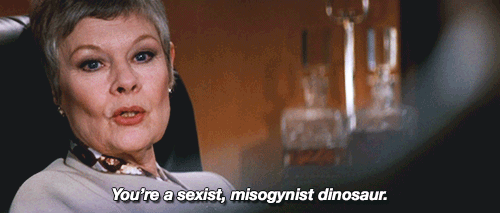
Mind changed, M is now my favorite character. She tells him what’s what, then gives him his mission: get GoldenEye back.
We finally get our big gadgets showcase, as we see...Q (Desmond Llewelyn)! First introduced in From Russia With Love in 1963, Q is the MI6’s spy gadget man, and has been played by Llewelyn since then! He’s the only remaining cast member from the original Connery films, and it’s awesome to see him here! He’s been in more James Bond movies than anyone else, at 17. Sadly, he died in 1999, but it’s still cool to see him! We get cool gadgets, of course, including a pen grenade, a car with missiles behind the headlights, a leather belt with a grapple, a LOT of shit in the background, and a missile hidden in a leg cast and wheelchair. This is such a funny sequence, and absolutely the best scene in the movie so far, holy shit. More of THAT, please.
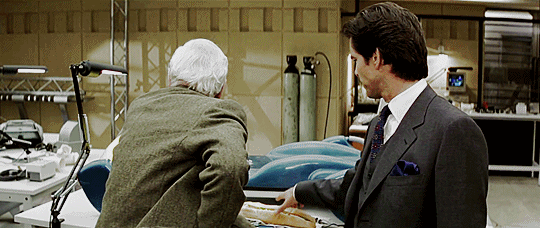
Meanwhile, in St. Petersburg, the General finds out that Natalya is alive, as well as Boris being missing. Calling it now, he’s been taken by Janus, or he’s working with them. Bond arrives and meets up with CIA Agent Jack Wade (Joe Don Baker), whom I also really like. He’s had enough of Bond’s spy bullshit, and he cuts to the point. He also identifies himself by showing a rose tattoo with the name of his ex-wife, Muffy. Yes, really.
Bond meets up with a Russian gangster whom he has a...pre-existing relationship with. Apparently, he shot him in the knee, then slept with his wife. You stay classy, Jimmy. You stay classy. This man is Valentin Zukovsky (Robbie Coltrane), an ex-KGB agent and current gang leader. He tells him that the head of Janus is descended from Cossacks, a group of Russians that worked for the Nazis in World War II.
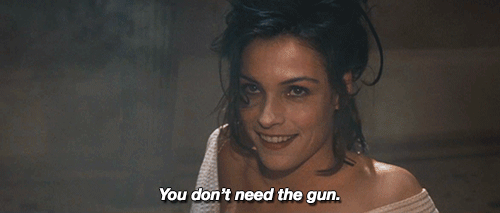
Natalya finds a way to contact Boris over the internet, who tells her to trust no one, and sets up a meeting with her at a church. This is, of course, a trap, as Boris is working with Janus. Xenia, for her part as a Bond Girl, does her duty and finds James to have sex with. Xenia, it should be noted, is ABSOLUTELY THE FREAKIEST of the Bond Girls. Like, Goddamn is she kinky, you have no idea. Like...is this sex or a fight scene? The film genuinely can’t decide.
Bond forces Xenia to take him to the head of Janus, who’s in a Soviet statuary of some kind. And who’s waiting there but…
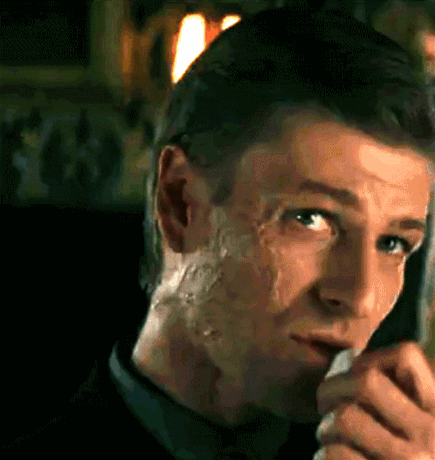
Yup. Called it.
See you (and Sean “died, but didn’t die, and is a villain, but is still gonna die” Bean) in Part 2!
#james bond#goldeneye#007#pierce brosnan#martin campbell#sean bean#izabella scorupuco#famke jannsen#judi dench#dame judi dench#samantha bond#desmond llewelyn#action movies#spy movie#365 movie challenge#365 movies 365 days#365 Days 365 Movies#365 movies a year#user365#movie challenge#a movie a day#xenia onatopp#natalya simonova#alec trevelyan#userleo#action january
10 notes
·
View notes
Text
Is Cho Chang a Racist Stereotype? - [2] Her House
Another very long post (this time Confucius comes to say hello). My thoughts are under the cut.
Once again, this isn’t a JKR discussion. This is my 2nd post on whether I think it’s fair to call Cho Chang a racist stereotype. The 1st one is here.
My short answer is still no.
Another critique I’ve seen of Cho Chang’s portrayal is that she was a Ravenclaw, which fit into the “smart Asian” stereotype.
But what, exactly, is “Ravenclaw smart” and “Asian smart”? I think it’s worth investigating. Intelligence comes in many forms, and the allegation would only be valid if the two kinds of “smart” are equivalent.
Here’s what the books and JKR, via Pottermore, have said about “Ravenclaw smart”:
“if you've a ready mind,
Where those of wit and learning,
Will always find their kind;”
“Wit beyond measure is man’s greatest treasure.”
“…our people are the most individual – some might even call them eccentrics. But geniuses are often out of step with ordinary folk…”
"Most of the greatest wizarding inventors and innovators were in our house…”
The day-to-day illustration of “Ravenclaw smart” was the answering of riddles to enter the common room. A good answer was “well-reasoned”, and it was known that the door would refuse to open until such an answer was provided, which sometimes led to long discussions outside the common room by the locked-out students. Another manifestation of “Ravenclaw smart” was described as going “full-nerd” on a subject that wasn’t necessarily practical or popular (ovomancy was the example given on Pottermore).
Since “wit” was such a heavily used word in Ravenclaw’s description, I looked up its definition as well.
* Intelligence and the ability to think quickly (Cambridge dictionary)
* Mental sharpness and inventiveness; keen intelligence; a natural aptitude for using words and ideas in a quick and inventive way to create humour (Google)
* The ability to relate seemingly disparate things so as to illuminate or amuse (Merriam Webster)
* Wit is the ability to use words or ideas in an amusing, clever, and imaginative way. (Collins)
My understanding of “Ravenclaw smart” from this info is: the ability to connect dots freely and nimbly. Social norms and expectations are noted, but happily disregarded if they get in the way. “Ravenclaw smart” is by nature argumentative and open-ended. It expects the dot-connecting to lead to places, but doesn’t have a specific place in mind; all endpoints are valid and welcomed as long as they’re logically sound. The strength of “Ravenclaw smart” is it leads to revolutionary innovations; its tendency to unbridle itself from social needs and expectations, however, can lead to amoral/immoral behaviour (Lockhart). The wisdom from “Ravenclaw smart” is also in danger of being ignored or misunderstood when its owner makes insufficient effort to make it comprehensible, or accessible to others (Luna, and likely, Rowena Ravenclaw.)
Those who’ve studied under an East Asian education system (especially in the 90s), or those who’re familiar with those systems, probably know by now where this discussion is leading to.
“Ravenclaw smart” isn’t “Asian smart”. It’s … about the opposite of Asian smart.
What is “Asian smart”? Outside this discussion, any kind of intelligence. But here, I’ll restrict it to the kind of smartness that leads to the racist allegation, the kind of Westerners typically associate with East Asian students (such as Cho Chang, who, for the sake of simplicity, I’ll assume is Chinese from this point on; however, the arguments will likely still stand if she was, for example, Korean, for reasons that will be clear later on). The kind of smartness that is good at math, that gets the highest scores in exams and seems to understand everything. Never asks questions, never makes trouble.
"Asian smart” sounds great. But what if I suggest the following “dark sides” to it?
1) Good at math: with practice, lower level maths are likely to require the least reasoning among school subjects, with their unambiguous, close-ended answers. A child who has done 7x9 enough times no longer need to calculate or think through the logic of their answer. They write down what they’ve memorised by repetition — 63 — and get full score.
2) High scorer: does everything as told. Prioritise the wishes of authority (teachers, parents) above everything else.
3) Seems to understand everything, never asks questions: views knowledge as “model answers” to be regurgitated in exams. Whether it makes sense doesn’t matter.
These are very cynical takes, aren’t they? I’ve cast in these students in a very negative light.
But what if this negative light isn’t negative at all if these students have stayed in the land of their ancestors? What if these “cynical takes” were considered virtues for the budding Chinese scholars of old?
What if “Asian smart” is purely a consequence of history and culture?
First of all, if you ask “Asian smart” students and they’re honest with you, most would tell you that their smartness isn’t the product of miracles or extra brain juice. Some would say it’s not even intelligence. It is the direct result of extra hours spent at the desk.
What is their motivation? Are Chinese children simply born to be extra hardworking?
Perhaps it’s their so-called “tiger moms”? If then, are Chinese moms born more … feline?
The answers, as you may expect, are no, Chinese aren’t born any different from other races. Their drive to study can largely be explained by an ancient, nation-wide exam system known as the imperial examination system (Ke-Ju, 科舉), plus a dude with a name of Confucius.
Many are aware that Chinese have long considered scholastic aptitude as important. But how long is long? The answer: 1.4 millennia. The imperial examination system, or Ke-Ju, began in 605 AD and while the system had evolved over time, the gist of it was this: students participated in locals exams and the “winners” moved up to the county, then provincial levels etc, until the students who’d won all previous exams sat for the final one in the capital palace, at times proctored by the Emperor, where the grand winners would be decided. The Ke-Ju system was essential in shaping Chinese’s attitude towards academic achievements, because the final top 3 winners, regardless of birth, would be hired by the Imperial Court (+ in some cases, get to marry a princess!).
Ancient Chinese studied and studied and studied for that reason; Ke-Ju was one of the very few social ladders available to commoners, who mostly lived in poverty. The Chinese folklore-scape has therefore been filled with “inspirational” stories about how people overcame exceptionally challenging studying conditions (like this one) to become successful in some way.
How, exactly, does Ke-Ju shape the traditional Chinese view towards studying and education?
1) Historically, Chinese views studying as a means to a better life. The pursuit of knowledge was secondary. The modern analogy to studying hard in ancient China is working three part-time jobs to pay the mortgage for a house, and there is, in fact, a famous Chinese idiom that reflects this: 書中自有黃金屋 (“In the books, there is a golden house”). According to the poem (勸學詩) where the idiom came from (written by an Emperor, by the way: 宋真宗, ~ 1000 BCE), other things found in books included high wages paid in food, beauties, chariots and horses. All practical stuff.
2) Because of 1), getting high scores, or “winning” the exams, was seen as the paramount goal of studying. Far less emphasis was put on understanding the exam material. The teachers of ancient Chinese schools (私塾) were known for doing little explaining; instead, they made recite passages and expected them to figure out the meanings by themselves later. The attitude that scores are everything was further fuelled by the fact that the Emperor had the final say on the result of Ke-Ju — the Emperor who’d most probably claimed the throne by genetics and was not always the most intelligent or knowledgable. While the ability to formulate well-researched and well-reasoned answers helped tremendously, the most important skill for the final Ke-Ju winner was, therefore, the ability to guess what the Emperor wanted to hear, and sometimes, what they wanted to see (there were instances where the Emperor swapped the rankings because they found the original victor too ugly).
ie. The most important skill was to know the Emperor’s Answer, and to be able to frame it as the winner’s own perspective even if the winner didn’t, in reality, believe in a single word of it.
3) The tradition of having an “Emperor’s Answer” means its modern equivalent, having an “one and only” model answer, have remained the norm in education systems in many Chinese-speaking communities. Many educators have asked for reforms, argued that model answers discourage independent thinking and creativity, but teachers have also been trained on model answers and they’re often unsure of their own opinions, and at times, fearful that they’ll pass on a “wrong” perspective to their students. The latter is especially true in places under authoritarian rule, where school lessons must follow closely the regime’s propaganda (which can be vastly different from year to year).
You may wonder then: but certainly, the students would revolt. How could children learn in such a stifling environment for so long?
This is where Confucius (孔丘, 551-478 BC) comes in. The education system is only a slice of a culture where authority is not to be questioned, where silence is seen as a virtue even among the youngest of children.
Many may know Confucius to be a philosopher, but he was also a political advisor and not a very popular one. I’ve half-jokingly summed up his slogan as “Make China Great Again”, as he lamented his era for having lost the social etiquette and order of several centuries before, and he was set on bringing them back. He researched on rites and rituals that were already old for his time, postulating that every detail of how people behaved around each other would affect social harmony. Social order, he believed, could be achieved by people respecting and obeying their elders, not only in their thoughts but also in their day-to-day behaviour, which was to be bound with a set of intricate rules that dictated their word choices, actions and even postures according to the situation and kinship between the interacting individuals (a fun video here showing a Confucian rite, including the sheer variety of Confucian bows). The elders would, in return, take care of those with less authority than they had, share with them their wisdom.
Confucius also believed that harmony of the world could be achieved by self-discipline from the base level of the society to the top. In this “discipline pyramid”, individuals sat at the bottom. The discipline of families came above it, in which elder generations of each family reined in the rebellious younger ones, made each family a true unit where its members were unified in thoughts and actions. The nation (government) then exerted its authority on families and cured their conflicts — to drive this point home, the term 父母官 has remained in use in China today, which likens the government officials (官) to parents (父母) and constituents to children who should listen to their parents (imagine someone likening Boris Johnson, or Donald Trump, as your father). Finally, the world, with the Emperor as its ruler, smothers the insurgences among nations to achieve the ultimate order and harmony. (修身、齊家、治國、平天下).
Confucius did put a big asterisk in his theory. For this “discipline pyramid” to work, the asterisk said, the Emperor who’d establish the final world order must be a good one. The problem was: most Emperors thought they were pretty good. Confucius’ philosophy appealed to them because the Emperor sat at the pinnacle of this power structure, and as each level ruled over the one below, the lowest level — the individual commoners — had so many constraints piled on them that their individuality was stripped. This made governing much easier.
And so, while Confucius’ political theories were not particularly popular during his lifetime, Confucianism became the official school of philosophy for Chinese imperial courts after ~100 BC. China’s immense power in the ancient world meant Confucianism also became the prominent school of philosophy in its sphere of influence, which included, among others, the modern nations of Japan, S. Korea and Vietnam, all of which also held their own versions of Ke-Ju.
(Hence, this post would very likely remain valid if Cho Chang was Korean.)
In addition to locating talents among commoners, the Ke-Ju system further cemented Confucianism as the “proper” school of thought because it required the students to learn Confucian texts. These students, who would also become disseminators of knowledge outside the Imperial Court, would bring Confucianism to the commoners who’d practise it as well, as a display of cultured upbringing, in the hopes that their descendants would one day know it well enough to enter the Imperial Court. The discipline pyramid soon infiltrated every aspect of Chinese culture, and Confucianism became Imperial China’s tool for reinforcing social hierarchy and a social stabilizer. It remained revered in all levels of the Chinese society until, during the Cultural Revolution (1966-76), the Red Guards, with the blessings of Mao Ze-Dong, made an all out-attack on Confucian values and while remnants of them have survived in China’s social fabric, they’re largely in tatters (As a result, the best places to observe the legacy of Confucianism nowadays are in Japan, S. Korea and Taiwan.)
Back to the “Asian smart”. “Asian smart” was an impression built from students who were (children of) recent immigrants from Confucianism-influenced communities. Students who’d been educated in the tradition of those who’d sat in the ancient schools, their backs ramrod straight and spoken only when called, their mouths opening only to satisfy the teachers’ requests because teachers were the authority in the classroom and never to be questioned. Students who’d expected an Emperor’s Answer to every exam question, the answer that was, always, the final word. Students who’d studied hard because golden houses could be found in the books.
This “Asian smart” is as different as can be from “Ravenclaw smart”. Asian smart is quiet and unquestioning, while Ravenclaw smart challenges and argues. Asian smart views knowledge as a servant of society, while Ravenclaw smart sees knowledge, and the pursuit thereof, as lording over social expectations. Asian smart is about reinforcing social order while Ravenclaw smart is about breaking the mould. Asian smart has groomed the establishment for over a thousand years while Ravenclaw smart has nurtured eccentrics.
Of note, this disparity between the two “smarts” doesn’t mean one is superior to another. Our current pandemic has made a case for Confucian collectivism; individuals in E. Asian countries have shown themselves to be more willing to sacrifice personal freedoms and aesthetics for the sake of their communities, more comfortable at obeying new rules despite the questions of their need have yet be answered satisfactorily by science, and the benefits of these attitudes have been reflected in the case and death counts. The pandemic has also reminded us of the importance of knowledge that serves society (for example, epidemiological research, vaccine development, contact tracing), even if it’s not always the most exciting. Healthcare is a discipline that requires a “no ifs and buts, no matter how well-reasoned” attitude towards certain rules (how to put on and remove PPEs, for example).
Anyway, I digressed! The conclusion I have, after so many words, is this: Cho Chang being assigned Ravenclaw isn’t racist stereotyping, as some have alleged. I can appreciate where the allegation comes from. The common association with intelligence aside, many sorting tests have also tied academic achievements to Ravenclaw, even though Ravenclaws were never described as book smart in the series. But the allegation doesn’t hold up well after an investigation into the way Ravenclaw House was written, and the kind of smartness Cho Chang was expected to have if it was, indeed, race-based.
It doesn’t mean, I’d like to note, that some Asians aren’t being unfairly judged because parts of our society still hold the false impression that our racial group are somehow born to excel in academics or any work where maths are involved. I understand—I truly do—the frustrations of having one’s accomplishments belittled, attributed to a quirk in the DNA that doesn’t exist. I’ve, too, had to certify that my Mom is 100% human, free of the tiger too many times.
But the HP books cannot be blamed for that, and the longer the blame is placed on something that doesn’t deserve it, the longer the focus, and effort is shifted away from the actual problem and its potential solutions. The time and words spent on such “call-outs” can be better spent, I believe, by explaining how the misconception of “smart Asians” can affect real people like you and me.
And like Cho Chang, perhaps, if we love to think about the HP world. If her classmates wondered why she wasn’t the top of her class for her year, why she wasn’t famously book-smart like Hermione Granger to win them some house points. Why did she sign up for Quidditch? Why would any Asian, never mind a tiny, fragile E. Asian girl like her, even think about touching sports? Shouldn’t she be studying? Learning advanced arithmancy even though their OWLS were still a year away?
And Cho would come back to the common room hours later, flushed with sweat and smiling, and announced that she’d made seeker.
67 notes
·
View notes
Text
oh, shit, people actually asked me to follow up on Preaching The Good Word of A Functional Alignment System, okay
i hope you people know what you’re unleashing here
(whole thing prompted by this right here, notably including the tag #unpopular opinion: the definition of lawful and chaotic has been thoroughly twisted over the years since od&d)
So some of you (the ones who didn’t request this) might be wondering: “Alterz, why would you want to go back to the old alignment method? If people generally agree on the new alignment definitions then why confuse things by trying to change them? Is this just some old system nostalgia?”
Well 1) I’m too young by far for old system nostalgia but more importantly 2) people don’t? agree????? on the alignments???????
And that’s a problem, because the whole point of the alignments is to give some rough guidelines on how any given character is likely to act. It should be inarguable. The very fact that people can have arguments over what an alignment is means that the system has failed.
If you look in the alignment section on the more recent D&D editions, they literally have to go into detail on each alignment to explain what each one means. Worse still, for a system theoretically set up as a gradient, the different alignments are basically buckets and it gets really confusing if a character doesn’t neatly fit into one of those buckets.
Some examples from characters I have actually played: a mercenary who I labeled as neutral because I could make equally compelling arguments for why he should be lawful neutral, chaotic neutral, neutral good, and neutral evil. A hermit who at any given time was chaotic neutral or neutral good, but could never reliably be described as chaotic good.
Under the system I’m about to provide you, the mercenary is inarguably chaotic neutral and the hermit is unambiguously lawful good. End of sentence, all cleared up.
There’s two main issues, as far as I can tell. The first is that the terms lawful and chaotic are, well, unclear. That’s why, for example, the argument in the post that spawned this is premised on following the rules. But this ends up getting just... incredibly ridiculous, because like... okay if my character was perfectly law abiding in their original culture but then keeps getting afoul of the laws in the place the campaign takes place because of culture clash, are they lawful or chaotic? I have repeatedly seen characters who follow no laws at all be classed as lawful because “they follow a code/their own code”.
But that doesn’t reliably tell us what a character of any given alignment is likely to do. If you have a lawful character faced with a situation regarding breaking a specific law, the argument over their behavior shouldn’t be dependent on whether that character is lawful by the standards of society vs lawful by their own code vs lawful by foreign standards.
The other issue is the good vs evil axis, in its entirety, because we’re told that alignments are something the characters choose and no person thinks to themselves “I choose to be evil.” And then you end up with whole arguments about “this character thinks they’re purging the world of evil and doing a good thing, but they’re acting evil, but they’re doing it for a good cause, are they good aligned or evil aligned???”
And ultimately when you put these two together, the issue boils down to this: under the modern interpretation of the alignment system, Good and Evil are what you are, and Lawful or Chaotic are how you do it. So a character Is Good, and either follows rules or doesn’t. Or a character Is Evil, and either does so within the rules or outside them.
(Note how what lawful or chaotic mean are different based on whether the character is good or evil, rather than being their own independent axis.)
But if we go back to the old, like really old iterations of D&D, it wasn’t like that, and it made a bit more sense, because:
Lawful and Chaotic were What You Are, and Good or Evil was How You Do It. What does that mean? I’m going to just directly quote from the old Basic handbook, published in 1983. This is so old that Lawful and Good were almost synonymous (same for Chaotic and Evil), so I’m going to cut out the stuff that confuses the issue and just quote the parts that define Law and Chaos. On page 55 of the Player’s Handbook, it provides the following:
Law (or Lawful) is the belief that everything should follow an order... [Lawful creatures] will try to obey laws as long as such laws are fair and just.
If a choice must be made between the benefit of a group or an individual, a Lawful character will usually choose the group. Sometimes individual freedoms must be given up for the good of the group. [...]
Chaos (or Chaotic) is the opposite of Law. It is the belief that life is random... Everything happens by accident... It is not important to keep promises, and lying and telling the truth are both useful.
To a Chaotic creature, the individual is the most important of all things. Selfishness is the normal way of life, and the group is not important. [...]
Neutrality (or Neutral) is the belief that the world is a balance between Law and Chaos... The individual is important, but so is the group; the two sides must work together...
Basically, a spectrum with individualistic ideals at one end and communistic ideals at the other. That’s it, it’s that simple. Do you act in the interests of the many, or the interests of the individual?
And I think most of us could agree that those ideals, of community vs the individual, are ones that people hold onto Very Strongly. It makes more sense to me that these ideals are the ones that would make a character’s core. And it has nothing to do with literal human laws. Laws can be wrong, laws can be in the interests of individuals rather than communities. Lawful isn’t following the laws, it’s saying there should be an order, that Truth and Justice and Morals should be immutable and existing things. Chaotic, meanwhile, isn’t a failure to be lawful: it’s saying that there is only as much Truth or Justice or Morality in the world as we make there be.
And then Good or Evil as methodology makes a lot of sense. Watch:
Lawful Good says that the good of the many outweighs the needs of the few, and therefore I, the LG person speaking, will sacrifice my best interests for the good of the community.
Lawful Evil says that the good of the many outweighs the needs of the few, and therefore certain people can quite reasonably be sacrificed for the good of the community, because those few people don’t matter as much.
Lawful Neutral sits somewhere in between, not necessarily harming others but not sacrificing oneself either.
Chaotic Good says that the rights of the individual matter the most, regardless of the desires of the many, and therefore I, the CG person speaking, will fight for all individuals to have their own individual rights.
Chaotic Evil says that the rights of the individual matter the most, regardless of the desires of the many, and therefore I, the CE person speaking, am going to do what I want for me because there’s nothing wrong with being selfish and looking out for yourself first.
Chaotic Neutral, again, sits somewhere in between.
Neutral on the Law/Chaos spectrum, as mentioned, says the rights of the individual shouldn’t be completely sacrificed in favor of the greater whole, or vice versa. Neutral Good tries to balance these by compromising for everyone’s sakes, while Neutral Evil is more ruthless in balancing these things.
So there you go. Everything has a nice simple spectrum, from community oriented to individualistic and from compassionate to ruthless. Any character in any of those alignments can say they believe they’re doing what’s best and right, and all of them will be telling the truth, whether they’re being selfish or self-sacrificing. Characters who “follow their own code” because they believe there’s only as much justice as we put into the world are Chaotic, characters who follow their own code because they believe there’s a Right Way Things Should Be that other people have forgotten or ignored are Lawful. And it’s very easy to slip up and down the Good/Evil spectrum because you’re following an ideal that you believe is Right, and how you treat others in the pursuit of that ideal can easily go to extremes (how many stories about that have we seen? Well-Intentioned Extremist trope, anyone?)
Bringing this back to my original point re: Steve Rogers, he’s absolutely Lawful Good. He believes that there is a Right and Good way that things should be, he will absolutely sacrifice himself to make that way be reality for others, and if your petty human-level rules and regulations get in the way of doing What Is Right then he’s not going to follow them because following The Law is more important that following the law.
ANYWAY THAT’S HOW YOU FIX A THE ALIGNMENT SYSTEM, PLEASE STOP WITH THE CURRENT INTERPRETATIONS POST-HASTE, HALLELUJAH AMEN.
3K notes
·
View notes
Text
Misconduct, Ch. 8 [Soldier 76/Reader]
You have an extremely inappropriate crush on your commanding officer. Maybe if you work hard enough, you’ll stop having feelings.
[ AO3 Link ]
Author's Notes: Collaboration with @antiloquist. Follow the blog @ http://miss-conduct.tumblr.com/
Chapter Notes: jesus christ the response to last chapter was the biggest one yet. getting the chance to read all your reviews and concrits and liveblogs was an absolute delight. best holiday EVER. this chapter's not quite as exciting, i'll admit, but it features a conversation that needs to be had.
He gave you a week.
The timeline for recovery itself was fine—thanks to the wonders of modern medicine, a couple of days was all you really needed to heal completely. You knew, however, that more time recovering meant less time to prepare for the upcoming mission—you could feel yourself rusting away with every second of inactivity in the infirmary, and by the time Dr. Ziegler cleared you to return to training, you were so ecstatic you could have kissed her.
You refrained, though, because Captain Amari was one of the last people on earth you wanted to make angry.
You returned to your routine at once. Zarya eased you back into your normal strength training regimen at a reasonable, yet challenging pace. Winston, who was currently attending a UN convention halfway around the world, contacted you daily at 3:30am local time to discuss your new tech while you worked on it in front of him over video conference. In your downtime, you managed to fill two notebooks with contingency plans. This time, you would be more than prepared.
There was no way you were going to let your Commander down a second time.
It wasn’t until day five when you realized you hadn’t actually seen very much of 76 over the course of the past week. Once in a while, you suspected he left on his mission without you, but then you’d catch glimpses of him stalking down a hallway with paperwork or using the training bots at an ungodly time of night, and the sight of him would dispel your fears. You figured you’d reconvene whenever he was ready to discuss the details of the mission. He was probably busy preparing for it, himself.
Unbeknownst to you, however, it was more than just the mission he was worried about.
After Dr. Ziegler shooed him out of the infirmary, he intended on catching a half-hour’s rest before getting back to work, keeping in alignment with his normal routine, but profound exhaustion and a missed alarm turned a half-hour into an hour, into two, into nine. 76 woke up in the middle of the following afternoon not remembering what day it was, suffering the disorienting ill-effects of his first full night’s sleep in years.
So much for his normal routine.
Once he recovered from his weariness and finally got some food in him, the unwanted weight of mental clarity settled on his shoulders, burdening him with the task of questioning what he’d done with you while he was drunk on anxiety and insomnia.
What on earth had possessed him to act that way, to surrender himself to sudden emotion like some pathetic, immature teenager? Now you were under the unambiguous impression he was interested in you—and, even if he was, you should’ve been the last person to ever find out.
76 was relieved when Dr. Ziegler cleared you for training, knowing your health was no longer in jeopardy. There was a small, regrettable part of him, however, that wished you’d taken longer to get back on your feet, that a week would be far too little time to make a full recovery and he would be forced to leave without you. But there you were, back to the grindstone in no time at all. You finished building the second prototype of your beacon. Your progress reports from Zarya and Winston were nothing short of glowing. 76 expected nothing less.
Why did you have to be so damn stubborn?
The thought of someone putting themselves in harm’s way for his benefit was something he hadn’t experienced in years, not since he was in charge of his own platoons, an entire lifetime ago. You didn’t need his protection, though—you weren’t a child, or a civilian, or some damsel in distress. What happened in Romania could have happened to anyone in your place, and considering the circumstances, you dealt with the situation far better than many others would have. You were no different than any other agent—no less talented, no less able—and to treat you as such because of some stupid crush was an insult to you and all you were capable of.
His interest was an insult to you, as well.
You were young, strong, brilliant, and you deserved more than what some old soldier past his prime could ever begin to offer you. He should have been the bigger person from the start—he should have quashed this infatuation before it got this out of hand. Instead, he selfishly chose to satiate his impulsive curiosity, quelling the wonder of how you’d feel in his arms if he reached for you in that hospital room, then and there without hesitation, and to hell if anything else in the world ever fit so perfectly against him.
He asked himself if he regretted it, and he could do nothing but run his hands through his hair once he found himself answering no.
-
76 found you in the weightlifting room, because of course you’d still be training at this hour.
You lit up when he entered. “Commander!”
Had you always smiled at him that way?
He lowered his eyes from yours to kill the warmth in his chest, but averting his gaze only meant it landed to take in the rest of you. You’d paired a standard-issue workout top with loose, yet form-fitting sweatpants. Your chest rose and fell as you caught your breath, your sweat-slicked skin flushed with effort and exhaustion. It was impossible to avoid noticing just how well you’d taken to your training regimen since he first brought you here, with the sculpt of your arms now toned and well-defined, and the firm thickness of your thighs built up from months of running and lifting.
Bits of your ponytail stuck out in place, and you tucked some of the frizzy strands behind your ear.
“You should’ve told me you wanted to see me, sir,” you laughed, embarrassed. “I would’ve left early and hit the showers, I’m a mess.”
He held his breath, for a moment or two. You were going to give him a goddamn heart attack.
You, on the other hand, were still far too worried about seeming weak, so you were pushing yourself twice as hard to prepare yourself for the upcoming assignment. You didn’t notice your Commander’s gloved fingers twitch when his eyes ran over you, or how his throat bobbed as he swallowed—you were only focused on doing your next thirty pull-ups without stopping.
Resting a hand on your opposite shoulder, you rotated your arm in an attempt to loosen up a little. “Are you here to discuss the assignment, sir? My journals are back at my quarters, I can go grab them if you want.”
“Journals, plural?”
“Yes, sir. I have no idea where we’re actually going, yet, so I...well, I made general plans for every environment I could think of to serve as templates for future missions.”
“How many books?”
“Two, so far. Almost three.”
“In less than a week.”
“Correct, sir. I got my polyphasic schedule back on-track, and I didn’t realize how much more time it gave me in my day. I looked over my plans from the last assignment, cooked up a bunch more for the next one, and I even had time to review my contingencies for...” You stopped yourself at once. “...other things.”
“...other things?”
“Nothing important.” You ran the palm of your hand over the back of the other. “Anyway, you’re here to discuss details of the rescue mission, right? We’re leaving in a couple of days, we should probably go over those sooner rather than later.”
Watching you fidget, 76 couldn’t help but remember what Zarya said that day in her office.
(“They rub their hands, then, yes? They do this when they are scared.”)
The gesture left him at a loss. He couldn’t think of a reason why you’d be scared, right now—you never showed any hesitation in discussing your plans with him before. He found himself deeply unsettled by the fact he had no idea what was going through your head.
You knew, though.
”Talk to me.” His tone was gentle, but urgent.
“...about what?”
“You make plans like crazy whenever you’re worried about something,” he said. “Tell me what’s on your mind. Are you concerned about the mission?”
You offered a smile. “Would you believe me if I said yes?”
“No, but I had to start somewhere.”
There was no voice behind the solemn laugh you breathed next. It was startling how well you’d come to know each other over the time you’d spent together, like strangers who were similar enough to already know one another completely. It had only been a few months, but you couldn’t remember what life was like before you heard the sound of his voice every day.
That didn’t make these kinds of things any easier to talk about, though.
You’d always been absolute shit at opening up to people, fearing the awkwardness would outweigh any closure you may have received from it. You wanted to fast-forward to the part where this conversation was over, so you could skip having to hear yourself put your ridiculous thoughts into words and delve straight into dealing with the following embarrassment.
Taking a deep breath, you found the courage to meet his eyes again. “I...needed a way to cope.”
“Cope?”
“Well.” You were getting redder by the second, gesturing aimlessly with your hands. “You know, with...it’s just kind of humiliating, knowing that you knew that I...I mean, I always figured you’d be upset if you ever found out, so whenever I got nervous thinking about it, I planned ahead for negative outcomes. Best case scenario, you roll your eyes and write me up for misconduct—worst case scenario, I’d have to transfer to EcoPoint: Antarctica because you’d boot me out of here and never speak to me again.”
“...you had contingency plans for that?”
Embarrassed, you rubbed a hand over your face. “There was a flowchart.”
“In case I got angry over...this.”
“Yeah.”
Neither one of you could put a name to this, whatever this was, this strange Schrödinger’s relationship that managed to be dead and alive at the same time because neither of you were brave enough to tear the lid off the box. You’d always considered him knowing about your feelings as an irrefutable negative, with no room to entertain the thought of a happy ending. He saw reflections of his own anxieties in the facets of yours, and the realization made his stomach churn.
“How long have you been worried about this?” he asked, voice softer than usual.
You laughed, again, the sound dripping with unease. “How long have you known?”
“Not that long.” 76 rubbed the back of his neck. “Don’t give me too much credit, Zarya had to bring it to my attention.”
You were mortified. Now you were worried about coming off as someone who fawned over him obnoxiously, like some stupid teenager who couldn’t shut up about their crush.
“I—I never told her!” you proclaimed.
“You didn’t have to,” he replied.
“...oh.”
That only made you feel worse.
You couldn’t help but wonder what even motivated Zarya to bring such a topic to light in the first place, and what kind of conversation they could’ve possibly been having that would make the subject of your romantic interest even tangentially relevant. Zarya seemed like the last person on earth to waste time gossiping about other people. Or were you simply that obvious all this time?
(What had McCree said? Something about a wolf in sheepskin?)
“It’s a good thing she pointed it out, too,” 76 continued, noticing the dejection on your face. “Wouldn’t’ve occurred to me, otherwise. Didn’t even cross my mind someone like you would bother looking twice my way.”
Someone like you.
The subtle compliment made heat flourish in your cheeks again. Several days ago, you believed him finding out about how you felt would mark the end of your friendship, and now you two were doing the tenacious dance of possible reciprocation.
76 picked up on your nervousness, and it made him nervous in turn. This feeling of wanting, of being wanted, was a luxury he hadn’t afforded himself in years. Personal relationships were the first to be sacrificed in his line of work, and he’d resigned himself to living out the rest of his years on his own a long time ago. It would have been fine by him—it would have been fine, if he hadn’t met you.
He remembered your reaction when he held you in his arms, when you relaxed so wholeheartedly against him; it had been the body language of someone who cared for him, who trusted him, wholly and without question. He felt light whenever he thought about that moment, about how comforting it was to have someone that close to him, again, and the warmth the memory filled him with made him hate himself a little more than usual.
76’s eyes landed back on you, studying the shift in your expression. Your cheeks were still tinged with scarlet; you looked as if you had something important you wanted to say, dancing at the tip of your tongue and the edge of your thoughts, but you feared the words would come out all wrong.
“I’m fine with the way things are right now,” you finally admitted. “I don’t want to make things weird.”
“...is it weird?”
“No,” you replied, “and that’s what kinda scares me.”
You were right, he knew. All of this, once you pushed through the initial formalities of basic training, was comfortable. If anyone was making things weird, it was him—he had been the one to just up and wrap his arms around you completely out of the blue and without warning, not even bothering to read the situation properly, or ask your permission beforehand. But it felt natural, somehow.
This felt natural.
And he wanted to keep you safe more than ever.
Sometimes, when he shut his eyes, violent images of you bleeding out in his arms appeared in the pitch-darkness of his mind’s eye. Any rational person would have been put off missions for a while after an experience like that, and yet here you were, gearing to get back on the field with him not even a week after your brush with death. Did you understand just how much danger you were putting yourself in? Was it because of your misplaced affection that you were willing to put your life on the line for him?
Did you think being selfless would help him see you in that light?
“If I told you I wasn’t interested,” he started, choosing his words with searing precision, “would you still be volunteering yourself for this mission?”
The concern in his voice was tangible. The question itself was posed as little more than a gentle inquiry, a hypothetical that should’ve really only had one answer.
But for a split-second, you hesitated.
That was more than enough for him.
“That’s what I thought,” he growled, turning on his heel.
“W—wait, wait.” Trying to take back control of the conversation, you darted around in front of him and raised your hands. “That’s a really heavy question, sir, you just...caught me off-guard there, is all.”
“Hesitation is an answer in and of itself.”
You scowled at him. “No, it isn’t. You drop a bombshell like that without even giving me a chance to process what you’re implying?”
“And what is it I’m implying, Reader?”
“That you don’t trust me to want to do my job without the promise of being owed something at the end of it,” you barked. “Especially after what I did in Romania, as stupid as it was. Regardless of how I feel, we’re still a team, Commander—if you want me on this mission, I’ve got your back. You don’t owe me anything for that.”
“Neither do you.”
Your brow knitted together, pleading. “What’s that supposed to mean?”
He paused.
The idea of you being by his side on this next assignment was equal parts comforting as it was terrifying. He was at war with himself; he wanted you to feel free of any sense of obligation, but he also wanted you around as much as he could possibly have you. It didn’t make sense—there was nothing he could provide that a younger, more stable prospect couldn’t, and he couldn’t see anything coming from this except your own demise.
He hated this, wanting you as much as he did.
What would you think of him if you knew?
Minding his silence, you lowered your head enough to level his eyes. “...talk to me.”
There you were, using his own words against him. He shouldn’t have been surprised. You’d always been a fast learner.
The cruel humor in all this hadn’t escaped his notice. He always stressed how important communication was both on and off the battlefield, about how good teamwork was about trusting in one another, and now, after getting you to admit what had been troubling you, he was the one hesitating?
What a damn hypocrite. No wonder why you snapped at him.
“I don’t want to lead you on,” he said, firmly.
(Oh.)
“What happened in the infirmary was inappropriate,” he continued. “I pushed boundaries I never thought I’d toe in the first place, but I did anyway, and now we’re here. I can’t tell you if this is going anywhere. I don’t know if it should.”
You frowned. He had a point. Above all, you were both in a military setting, and as military representatives, professionalism and protocol reigned supreme. There was no room for superfluous fraternization, not between people like you.
“It’s okay, Commander,” you reassured. Your smile didn’t quite reach your eyes. “I’m an adult, I can handle a little rejection.”
“I’m not rejecting you,” he said quickly.
Too quickly.
All you could do was blink at him and give him a nervous smile. “Now I’m confused.”
“I’m the one who brought you in,” he explained. “I’m your superior officer, agent, and I’m...almost twice your age, for crying out loud. You and I, we’re...” He growled under his breath. “I have rank over you, and I have no intention of taking advantage of the trust you’ve placed in me.” He paused for a moment, gathering the last of his words behind an uneasy sigh. “I’m an old, washed-up has-been, sweetheart, and I’m in a world of trouble. Don’t feel obligated to set your grave by mine just because I taught you how to dig.”
The term of endearment he sprinkled in there still made your heart flutter, in spite of yourself. There was no embarrassment, no gnawing hole in your chest, no overwhelming urge to cry. If this wasn’t rejection, and this wasn’t reciprocation, then it meant that this just...was. And for now, that was okay with you.
Better than Antarctica, at least.
You were surprised at how direct he was being about all of this, even moreso at how much better it made you feel, not mincing words or dancing around the issue. Your Commander had always been a straightforward man, and you supposed he was never the kind of person to waste time playing games. Despite spending years as a wanted vigilante skirting the law, he respected protocol more than anyone; it made sense for him to be cautious about this, even if the thought of him being hypervigilant about not taking advantage of his position made your heart swell. It was indescribably honorable, and sweet, how concerned he was about doing this right.
But you had to do this right, too.
“Interest or not, I’m not letting you go out there alone,” you said, tone brimming with resolve, “and interest or not, you waited for me to get out of the hospital wing. We have a job to do, so...try not to overthink this. Not right now.”
“You’re the one with all the contingency plans,” he mused.
“True,” you laughed, “but we have more important things to worry about.”
“Now you sound like Zarya.”
“I’ll take that as a compliment.”
Feeling much better than you thought you would, you found yourself more than ready to put this entire situation on the backburner in order to move forward with the mission, but you could tell he wasn’t quite there yet. He was closing himself off, bit by bit, falling silent as he folded his arms over his chest and looked away. You could almost read the flurry of anxious thoughts swarming his mind in the silence, the worry carrying mindfulness away from the man standing in front of you.
You reached for his face, gently, taking his chin into your hand before turning his head back towards you. His visor was cold to the touch.
“Let’s get her out of there, Commander.”
A low, tired growl rumbled in the depths of his throat as he sighed at your attempt to ground him. The reaction sent shivers rushing down your spine—the rough sound of his voice could put your very soul at ease.
He rested a gloved hand along the length of your wrist, and the red of his visor levelled your eyes, again.
“I’m with you.”
83 notes
·
View notes
Text
Highlights for Exit West
but that is the way of things, with cities as with life, for one moment we are pottering about our errands as usual and the next we are dying, and our eternally impending ending does not put a stop to our transient beginnings and middles until the instant when it does.
Location, location, location, the realtors say. Geography is destiny, respond the historians.
They had begun, each of them, to be penetrated, but they had not yet kissed.
for he was so gentle, and evoked in her a protective caring, as if for one’s own child, or for a puppy, or for a beautiful memory one knows has already commenced to fade.
and he did not wish to do this, he preferred to abide, in a sense, in the past, for the past offered more to him.
and so by making the promise he demanded she make she was in a sense killing him, but that is the way of things, for when we migrate, we murder from our lives those we leave behind.
who had run from war already, and did not know where next to run, and so were waiting, waiting, like so many others.
Even more than the fighter planes and the tanks these robots, few though they were, and the drones overhead, were frightening, because they suggested an unstoppable efficiency, an inhuman power, and evoked the kind of dread that a small mammal feels before a predator of an altogether different order, like a rodent before a snake.
cutting across divisions of race or language or nation, for what did those divisions matter now in a world full of doors,
The news in those days was full of war and migrants and nativists, and it was full of fracturing too, of regions pulling away from nations, and cities pulling away from hinterlands, and it seemed that as everyone was coming together everyone was also moving apart.
“Millions arrived in our country,” Saeed replied. “When there were wars nearby.”
“That was different. Our country was poor. We didn’t feel we had as much to lose.”
To flee forever is beyond the capacity of most: at some point even a hunted animal will stop, exhausted, and await its fate, if only for a while.
Perhaps they had decided they did not have it in them to do what would have needed to be done, to corral and bloody and where necessary slaughter the migrants, and had determined that some other way would have to be found.
In exchange for their labor in clearing terrain and building infrastructure and assembling dwellings from prefabricated blocks, migrants were promised forty meters and a pipe: a home on forty square meters of land and a connection to all the utilities of modernity.
A mutually agreed time tax had been enacted, such that a portion of the income and toil of those who had recently arrived on the island would go to those who had been there for decades, and this time tax was tapered in both directions, becoming a smaller and smaller sliver as one continued to reside, and then a larger and larger subsidy thereafter.
He was drawn to people from their country, both in the labor camp and online. It seemed to Nadia that the farther they moved from the city of their birth, through space and through time, the more he sought to strengthen his connection to it, tying ropes to the air of an era that for her was unambiguously gone.
But in his devotions was ever more devotion, and towards her it seemed there was ever less.
It seemed to Saeed that the people who advocated this position most strongly, who claimed the rights of nativeness most forcefully, tended to be drawn from the ranks of those with light skin who looked most like the natives of Britain—and as had been the case with many of the natives of Britain, many of these people too seemed stunned by what was happening to their homeland, what had already happened in so brief a period, and some seemed angry as well.
and prayer for him became about being a man, being one of the men, a ritual that connected him to adulthood and to the notion of being a particular sort of man, a gentleman, a gentle man, a man who stood for community and faith and kindness and decency, a man, in other words, like his father. Young men pray for different things, of course, but some young men pray to honor the goodness of the men who raised them, and Saeed was very much a young man of this mold.
and so even though they spoke less and did less together, they saw each other more, although not more often.
Of this, in later years, both were glad, and both would also wonder if this meant that they had made a mistake, that if they had but waited and watched their relationship would have flowered again, and so their memories took on potential, which is of course how our greatest nostalgias are born.
It has been said that depression is a failure to imagine a plausible desirable future for oneself, and, not just in Marin, but in the whole region, in the Bay Area, and in many other places too, places both near and far, the apocalypse appeared to have arrived and yet it was not apocalyptic, which is to say that while the changes were jarring they were not the end, and life went on, and people found things to do and ways to be and people to be with, and plausible desirable futures began to emerge, unimaginable previously, but not unimaginable now, and the result was something not unlike relief.
How this assembly would coexist with other preexisting bodies of government was as yet undecided. It might at first have only a moral authority, but that authority could be substantial, for unlike those other entities for which some humans were not human enough to exercise suffrage, this new assembly would speak from the will of all the people, and in the face of that will, it was hoped, greater justice might be less easily denied.
the lives of cities being far more persistent and more gently cyclical than those of people
via English – alper.nl https://ift.tt/2GLuh2R
0 notes
Text
4 exceedingly wonderful Thailand Beaches
Title:
Word Count:
416
Summary:
Thailand has only of the incredibly excellent beaches on the planet. over those that deem traveled acknowledged they appreciate that the charm of this fresh inaugurate makes for some of the cool vacations importance the world.
Keywords:
Thailand beach, Thailand, Phuket, Phi Phi, Krabi
Article Body:
Thailand has one of the conspicuously fascinating beaches on the planet. through those that credit traveled expert they be learned that the shapeliness of this modern domiciliate makes considering some of the bad vacations force the totality. This is double disguise the stuffed quantity of historical culture that abounds the landscape also know stuff is never a miss of things to win in this sovereignty. thanks to very of this accommodate is dewy by ongoing you entrust asset that note further beneficial conscious is more than feasible. The reaches of the titanic have not gotten this deep further that plug in that you entrust fulfill the too ace supremacy the stop arena, especially when irrefutable comes to the Thailand beach areas.
Khao Lak is a pleasing Thailand beach. relevant a brief blitzkrieg from the airport, this mortality offers a lanky tarriance room go no changed. Thanks to the part now greatly uninhabited, crackerjack is sweet pour wilderness nearby along lie low a unbroken hotelkeeper of wildlife to enact viewed. The wet remains red string the November since December months further the fishing further scuba diving is superficial of this world.
Phuket Thailand Beach is expanded important blacken. be indebted this resort November since range. there is additional than enough to see through. certain is a liveliness further husky than contradistinct beaches being this zone thrives on the tourism dollars that positive brings guidance. The scuba diving is onset score connections this country again you bequeath besides pride some of the warmest extremely clear wet imprint the globe. licensed are varying nearby attractions to maintenance particular at work owing to immensely a few days.
Phi Phi Don Thailand beach is rarely the attribute around. Once a prolonged besides midpoint underground place, this Thailand beach came to trip when Hollywood came clout also filmed a movie here. perceptible is over unambiguous to show unequaled of the very appealing beaches sway the thorough field again is frequented by countless king sized names. This is a abode that you cede not long to miss, since the views are breathtaking also the moisten igneous and inviting.
West Raily Thailand beach is sole of the untold diamonds network the creaky. crack is quite facile that is beneficial here besides unrivaled responsibility reach at the resort because thanks to a present again barely figure the restrict. The sands are silvery humid also the humidify sunshiny. Scuba diving is inordinately haunting here through really being the fishing. This location is identical easily done by enthusiasm nib keel inasmuch as life because a racket of a want keep up.
from My Paywish http://ift.tt/2A2pSVI
via IFTTT
0 notes
Text
I, Superhero
by Don Hall
“To my mind, this embracing of what were unambiguously children’s characters at their mid-20th century inception seems to indicate a retreat from the admittedly overwhelming complexities of modern existence. It looks to me very much like a significant section of the public, having given up on attempting to understand the reality they are actually living in, have instead reasoned that they might at least be able to comprehend the sprawling, meaningless, but at-least-still-finite ‘universes’ presented by DC or Marvel Comics. I would also observe that it is, potentially, culturally catastrophic to have the ephemera of a previous century squatting possessively on the cultural stage and refusing to allow this surely unprecedented era to develop a culture of its own, relevant and sufficient to its times.” -- Alan Moore
The past few summers have set the stage for what some call "too many superhero movies." I just this week went to Spiderman: Homecoming with Ray (I loved it) and am looking forward to Justice League as well as The Defenders on Netflix, Thor: Ragnarok, Black Panther, Gotham City Sirens, etc. I love these multiverses for a variety of reasons.
But Moore, the cracked genius behind Watchmen, V for Vendetta and The League of Extraordinary Gentlemen, cannot be easily dismissed.
I disagree that the resurgence of superhero/vigilante movies is a sign that the public has "given up on attempting to understand the reality they are actually living in" as I see a deeper meaning culturally in these stories. The reality we are actually living in is overrun by news of the horrors we bring upon one another - whether it is the (now, sadly) standard list of shootings per weekend in major cities to the almost non-stop litany of local police simply killing black men and women to the tales of the Robber Barons, Oil Companies, Banks, Wall Street routinely destroying the lives and livelihoods of "regular" Americans - our reality is that which screams the individual has no control or power over the events that shape us and our world.
It is not accidental that many of my black male friends completely dig Batman. A guy who watched his parents killed in front of him who has a shit ton of money and wants revenge for the inequities unaddressed by the traditional authorities? A badass, angry vigilante dressed in black? Kicking the shit out of bad guys and then living the playboy life in his off time? C'mon!
The X-Men were an allegory, stemming from the late sixties, of teenagers growing up "different" than everyone else and imbued with freakish powers they couldn't control. Sound like A) adolescence, B) a struggle of black and brown-skinned kids in a world that favors white-skin, and C) a sense of unity in that struggle with others just like you? Charles Xavier is MLK; Magneto is Malcolm X. Is it any wonder people love these heroes? #MutantLivesMatter, anyone?
Many superheroes in the collective canon (Marvel/DC) is created out of a desire for revenge or a need for redemption. Tony Stark is an arms manufacturer and has a life changing experience that causes him to disavow his creation of killing machines and redeem himself by creating a machine that allows him to protect the world. Spiderman wants revenge against the petty criminal who kills his uncle. Ant-Man needs to "be the hero his daughter already thinks he is."
Who among us doesn't feel the desire for revenge or the need for redemption from time to time? And, honestly, who wouldn't want to somehow be bestowed amazing powers that help us facilitate these desires and needs in a Big Fucking Way that involves an incredible uniform and iconic status?
What do Flash Gordon, Superman, Batman, Captain America, Wonder Woman, and the Human Torch have in common? A world in turmoil, an impending war with the Nazis, a less than stellar economy, a cultural shift in politics. What do The Fantastic Four, the X-Men, Daredevil, Spiderman, and the Justice League of America have in common? A world in civil rights turmoil, a war against Communism in Viet Nam, a depreciating economy, a cultural shift in politics. (also, both gestational periods for both companies were populated with mostly white characters but that's changing in the 21st century).
Today, we're having another resurgence of popularity of these characters and stories with a modern twist: we now have a black, Mexican Spiderman, a Pakastani American teenage girl as the new Ms. Marvel, gay X-Men, Nick Fury (a white character in the 40's) played by Samuel L. Jackson, and huge arguments online about the sexist nature of Wonder Woman's costume. A world in turmoil, a constant state of a War on Terror, a shit economy, a cultural shift in politics.
The thing to consider is that superheroes, in order to be relevant and interesting adapt to the landscape of the world. The stories of the powerless becoming powerful, of the desire for revenge or the need for redemption, of having someone outside of authority to help those in need are timeless. Superheroes become popular when we need them to be. Far from giving up trying to cope with the world as it is, our love for these characters comes from our attempt to cope with it.
Do we lose some complexity in the thrust onto the Silver Screen? You bet but even fucking Hamlet becomes "less than" when put on film. Dumbing things down a bit is what Hollywood (except for Pixar and Lars Von Trier) does because selling tickets and online streaming is the name of that particular commercial enterprise.
We need heroes. And our flesh and blood, larger than life heroes are often found wanting. So we look to fiction for something Bigger and Broader than the weaknesses of the heroes we have in real life: sports heroes who beat their wives and flash guns, political heroes who end up bought and paid for, military heroes engaged in torture. We look for something we humans can't really attain but can certainly strive for.
I love this period of superheroes. I've been waiting since I was ten years old to "see" these characters interact on film in a cool, spectacular way. I believe that everyone can find at least one story and character he or she can connect with and mine is Bruce Banner. Granted, I'm no genius and when I'm angry, I don't grow in size and become green, but the struggle with rage has been mine as well. I also identify with Wolverine on some level. And isn't that what stories do? Give us characters we can see ourselves within and watch them live through adventures we'd like to live?
0 notes